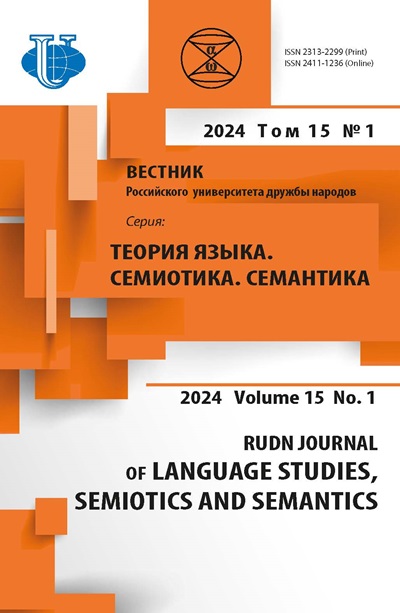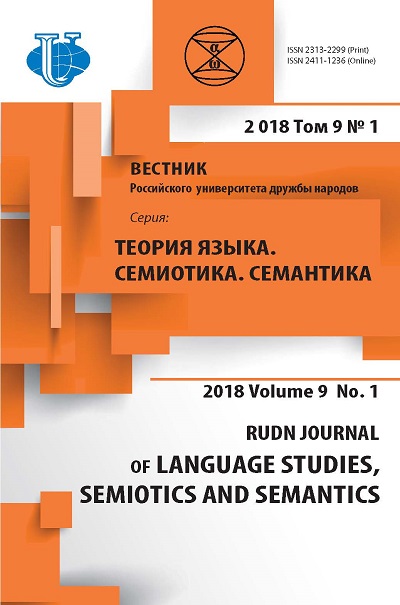The representation of Canada in political discourse
- Authors: Ustinova OV1
-
Affiliations:
- RUDN University
- Issue: Vol 9, No 1 (2018)
- Pages: 136-157
- Section: POLITICAL LINGUISTICS
- URL: https://journals.rudn.ru/semiotics-semantics/article/view/18273
- DOI: https://doi.org/10.22363/2313-2299-2018-9-1-136-157
Cite item
Full Text
Abstract
The primary purpose of this article is to examine the Canadian image in political discourse, to identify the factors creating this image. Due to the most relevant political speeches, messages, government reports, analysis of statistical data there are being worked out some tools for building the image of Canada on the world stage. Lately, political discourse is becoming a subject of study for linguistics. The interest in the phenomenon is motivated by a wide range of linguistic instruments used as an effective tool to manage the public perceptions. Study and analysis of the mechanisms of political communication allow to decode pragmatic information hidden in the political texts. The subject of the work consists in highlighting the linguistic approaches to the representation of Canada in the international diplomacy. The object of the work is an examination of political discourse in the public statements made by political figures, government documents, which reflect social and political realities. The methodology has developed under the influence of cognitive linguistics of domestic and foreign scientists. Research study includes cognitive and conceptual analysis to reveal distinctive features of the social and political realities; interpretive and context analysis to select political texts. It exposes the ways of representation of Canadian image, demonstrates its weak and strong sides. A vast factual material reveals multi-faced nature of Canada and provides an identity set of lexical units which are reflected in political discourse. The material illustrates today’s image of the country and the perceptions of Canada throughout the world. The idea of multiculturalism is justified by the guiding ideology of ethno-cultural plurality. The main sources of information are official government documents (laws, acts, reports), statistical data, parliamentary debates, party agenda, political speeches. All the provided material combined mass-media information, the Internet.
About the authors
O V Ustinova
RUDN University
Author for correspondence.
Email: deptphilology@gmail.com
Candidate of Philological Sciences, Senior lecturer, Assistant Professor at RUDN University. Research interests: theory and practice of intercultural communication, translation studies, semiotics of literary discourse, sociolinguistics
6, Miklukho-Maklaia str., Moscow, Russia, 117198References
- Corruption Perceptions Index. https://www.transparency.org/news/feature/corruption_perceptions_ index/.
- Global Peace index 2017. http://visionofhumanity.org/indexes/global-peace-index/ (accessed: 20.12.2017).
- Harris, M. (2015). Party of One. Stephan Harper and Canada’s radical makeover with a new afterword. Penguin random house.
- Hartz, L. (1964). The Founding of new societies: studies in the history of the United States, latin America, South Africa, Canada, and Australia. New York: Harcourt, Brace and World.
- Helliwell, J., Layard, R., & Sachs, J. (2017). World happiness report 2017. Canadian institute for advanced research and Vancouver school of economics, University of British Columbia. http://worldhappiness.report/ed/2017/.
- Positive Peace Index http://visionofhumanity.org/indexes/positive-peace-index/ (accessed: 20.12.2017).
- Schwartz, D. (2015). How Canada is perceived around the world? Canadian studies teachers and researchers comment on Canada. CBC News. http://www.cbc.ca/news/canada/how-canada-is-perceived-around-the-world-1.3132343 (accessed: 20.12.2017).
- Schwartz, D. (2012). How the world sees Canada: knowledgeable people give their views. CBC News. http://www.cbc.ca/news/canada/how-the-world-sees-canada-1.1130322 (accessed: 20.12.2017).
- Trudeau, J. (2017). Statement by the Prime Minister on Canada day. https://pm.gc.ca/eng/ news/2017/07/01/statement-prime-minister-canada-day (accessed: 20.12.2017).
- Trudeau, J. (2016). We’re Canada and we’re here to help. Justin Trudeau’s Message to UN. The New York Times. https://www.nytimes.com (accessed: 20.12.2017).
- Anohin, M.G., Bochanov, M.A., Vahovskiy, A.M., Grishin, O.E., Davidov, V.N., & Glebov, V.A. (2013). Politics in XXI century. Innovative technologies. Moscow. (In Russ).
- Asmolov, A.G. (2002). Russian media in multicultural society: tolerance and multiculturalism as guidelines for professional behavior (published studies and scientific conference). Independent Institute of Communication. Moscow. (In Russ).
- Basilev, V.N. (1998). Study of political discourse in Russia. Edition 2. Moscow. (In Russ).
- Baranov, A.N. (2001). Introduction in applied linguistics. Moscow. (In Russ).
- Baranov, A.N., Mihailova, O.V., Satarov, G.A., & Shipova, E.A. (2004). Political discourse: methods of analysis of thematic structure and metaphorics. Moscow: INDEM Fund. (In Russ).
- Widener, E. (2015). What can we learn from the Canadians? The Russian News Service BBC. (In Russ).
- URL: http://www.bbc.com/russian/society/2015/03/150323_vert_tra_can_canada_teach_us_ to_be_nicer.
- Galumov, E.A. (2003). The image of Russia in the world: buidling strategies. Moscow: Izvestia. (In Russ).
- Gerasimenko, N.A. (1998). Information and fascination in political discourse. Political discourse in Russia. Edition 2. Moscow. (In Russ).
- Gerasimov, V.I. & Ilin, M.V. (2002). Political discourse-analysis. Political science, 3, 68—75. (In Russ).
- Dyke, V. (1989). Language. Understanding. Communication. Moscow. (In Russ).
- Denisov, P.N. (1998). Public opinion in Russian language in the end of XIX — the first quarter of XX centuries. Moscow. (In Russ).
- Dianova, V.M. (2003). Cultural plurality in the context of globalization. Russia and Georgia: dialogue and common culture. Saint-Petersburg: Saint-Petersburg philosophical society. pp. 93—103. (In Russ).
- Kluev, Y.V. (2010). Hypothesis of public political discourse, Saint-Petersburg Vestnik, 9(2), 196—203. (In Russ).
- Kubriakova, E.S. (2008). To the definition of the image. Issues in cognitive linguistics. № 1. pp. 5—11. (In Russ).
- Malahov, V. (2014). Cultural differences and political borders in a time of global migration. Moscow: New literary review; Institute of Philosophy RAN. (In Russ).
- Maligin, A.V. (2012). Resources of modernization: possibilities and limits of international context: materials of the VII Convention RAMI. Moscow: MGIMO. (In Russ).
- Martinova, L.G. (2011). Modern Russian image: problems and prospects [dissertation]. Moscow: Russian Presidential Academy of National Economy and Public Administration. (In Russ).
- Maslova, V.A. (2008). Cognitive linguistics: a textbook. Minsk: TetraSystems. (In Russ).
- Maslova, V.A. (2001). Linguocultural studies: a textbook for students. Moscow: Publishing house ACADEMIA. (In Russ).
- Maslova, V.A. (2008). Political discourse: language games or wordplay? Political linguistics, 1(24), 43—48. (In Russ).
- Melville, A.Y., Ilyin, M.V., Meleshkina, E.Y. & Mironyk, M.G. (2007). Political atlas of modern times. Multidimensional statistical analyses of political systems of modern nations. Moscow: MGIMO-University. (In Russ).
- Minskiy, M. (1979). Frames for knowledge presentation. Moscow: Energy.
- Orlova, O.G. (2013). Discursive theory of stereotypes [dissertation]. Kemerovo. (In Russ).
- Parshin, P.B. (1986). Linguistic methods in conceptual reconstruction. Systems research. The annual review 1986. Moscow. pp. 398—425. (In Russ).
- Petrov, V.V. (1988). Language and logical theory: in search of a new paradigm. Linguistic matters. № 2. Moscow. (In Russ).
- Prohorov, A.V. (2013). Specific nature of the linguistic modeling. Vestnik of Tomsk State University. Human sciences, 125(9). 254—257. (In Russ).
- Sencov, A.E. (2012). Concept of future in agenda of ruling parties: comparative aspect. Theory and practice. № 6 (20). Part I. pp. 167—169. (In Russ).
- Sokolkov, E.A., & Bulankina, N.E. (2008). Problems of policultures and polilanguages in education in the humanities. Moscow: Logos. pp. 42—57. (In Russ).
- Stepanov, Y.S. (1995). Alternative world, discourse, fact and principle of causality. Language and science in the end of XX century: a collection of essays. Moscow: Russian state university for the humanities (RSUH). pp. 35—37. (In Russ).
- Taylor, Ch. (1994). Multiculturalism. Examining the politics of recognition. Prinston (N.J.). pp. 25—73.
- Ticher, S., Meyer, M., Vodak, R., & Vetter, E. (2009). Analysis methods of text and discourse. Harkov. pp. 197—198. (In Russ).
- Ustinova, O.V. (2016). The reflect of linguistic world view in the lexicology of Canadian French and Canadian English [dissertation]. Moscow: Peoples’ Friendship University of Russia. (In Russ).
- Cherkasov, A.I. (2002). Inter-ethnic relations in a multicultural country: Canadian experience. Part III. Canadian mosaic and Russia in past and today. Saint-Petersburg. (In Russ).
- Chudinov, A.P. (2008). Political linguistics: a textbook. Moscow: FLINTA.
- Sheigul, E.I. (2000). Semiology of political discourse. Moscow: Volgograd: Peremena.













